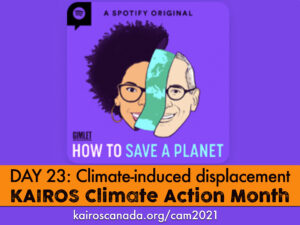Climate-induced displacement #KAIROSClimateAction

“Who qualifies as a refugee is a matter of debate…for those who’ve fled climate change, current law has little to offer.”
Sarah Stillman, New Yorker staff writer According to the United Nations High Commissioner for Refugees, “hazards resulting from the increasing intensity and frequency of extreme weather events…are already causing an average of more than 20 million people to leave their homes and move to other areas in their countries each year.” People from sub-Saharan Africa, South Asia, and Latin America are disproportionately affected. A World Bank report estimates that over the next thirty years, 143 million people will be displaced within these three regions alone.
Coastal communities and communities tied to subsistence activities like fishing and farming are most likely to be displaced by extreme weather. Some are internally displaced moving within their national borders and some become “climate refugees” by crossing international borders. Others have left their countries on what Sarah Stillman refers to as the “slow-onset changes that verge on existential – desertification, rising sea levels, land degradation, persistent drought.” People who are forced to leave their communities due to climate change are labelled as “internally displaced” or “refugees” and these labels determine what rights and opportunities they will have. These labels were created by antiquated international law that is ill-equipped to address the climate crisis.
“Only through a comprehensive restructuring of the economy and the society can climate justice be achieved. We must address the root causes of climate change, social inequality and injustice, and forced displacement,”
The Manila Initiative on the Rights of Climate Migrants.
New Yorker staff writer, Sarah Stillman explores the complex intersections between the climate crisis and human migration in her essay “Like a Monarch”. We invite you to listen to that essay today, read by actor and activist America Ferrera for the podcast How to Save a Planet.

Learn more:
Read Forced displacement in the Philippines by climate change and greed – again by Connie Sorio, KAIROS’ Migrant Justice Program Manager
Learn more and support KAIROS’ Empowering Temporary Foreign Workers During COVID-19 project
Learn more about the Climate Migration Forum.
Read more essays from women at the forefront of the climate movement in All We can Save: Truth, Courage, and Solutions for the Climate Crisis (edited by Dr. Ayanna Elizabeth Johnson and Dr. Katharine K. Wilkinson)



